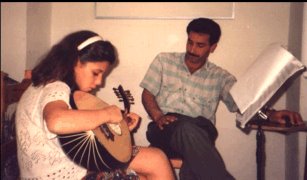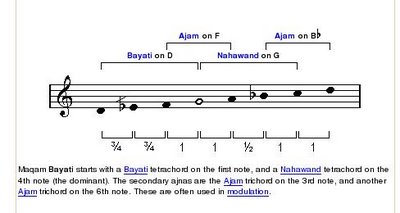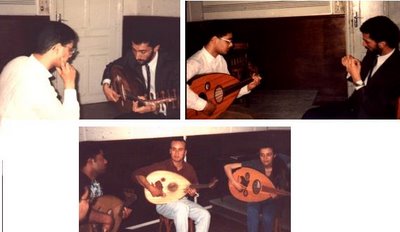Naseer and the lute
"When invented, Music has only gained its value and assets from being the spirit means for approaching God. For this reason, I want my music to remain the spirit of humanity through expansion and extension of the human soul" Naseer Shamma
The Arabic lute is a beautiful string instrument - similarly to the violin it's fretless - so you have no excuse - you must use your ear to play it and find all those notes- half notes and quarter notes that make up an Arabic maqam.
While I was staying in Tunis, every day on my way to my Arabic classes I walked past Amina Srarfi's music school. Having been playing the violin since I was 7 - I always tried to peep through the windows and see how Arabic kids learn music - I was wondering if it was different from the way I used to learn the violin in Hungary. The interesting thing was - whenever I heard kids play the violin - they seem to have been playing many of the classical melodies I used to learn at the conservatoir.
When I managed to find an open window - this is what I saw:

This went on for months - I walked past the building trying to catch a melody or an open window to see what is happening inside - and one day - I decided to walk right in and went to see Amina Srarfi - the director of the school. I told her I'd like to learn music and told her about my musical background - so she agreed.
I was really excited - I decided - I was going to learn the lute.
But there was a problem. I didn't have one. Lutes were very expensive - especially when one is a poor student - barely surviving on hostel food. So I decided I'd call my aunty and I'd tell her that things were tough and I need money. It worked - she sent me money and I rushed to buy my lute. I know this was really not nice of me - but once I saw the lute - I forgot all about this - you will know once you see one - lutes are beautiful instruments - and now I owned one.
Then my Arabic music studies started. I had a lute teacher and I also studied music theory. Both were new and exciting to learn since Arabic music differs so much from European classical music.
During the theory classes we learnt about different maqams.
During the theory classes we learnt about different maqams.
Instead of learning songs or complete compositions - we started first with a scale - in other words we learnt the notes in a specific scale (maqam) - some scales only had 2-3 notes some had more. And these notes were written down and given to us. The first step of learning scales was to be able to sing the notes. Then each scale also had its own rhythm structure - we turned over our lutes and practised tapping the rhythm on the back of the lutes. Once we got used to the notes and rhythm patterns of a maqam, then the teacher demonstrated the maqam by improvising on his lute - the improvisation was based on the maqam we were busy with. This was a revolutionary difference for me - when it comes to learning music. In my music schools in Hungary we simply learned given sonatas written on paper - we didn't focus that much on the scale itself or the rhythm - all we did was play the notes on the paper - every time the same notes - again - and again.
Here is an example - from Maqamworld.com :

With time I started to get used to the school, the lute players and the maqams - in a way it all reminded me of the weekly evenings I spent with the Calcutta trio back in Budapest - since the way they explained about Indian ragas were similar to the way I was learning the maqams.
Once I got to know more music students I also visited the main conservatoire in town.
It was in the conservatoire where I heard about the famous Iraqi lute player - Naseer Shamma - for the first time.
It was in the conservatoire where I heard about the famous Iraqi lute player - Naseer Shamma - for the first time.
He was teaching lute there - and I decided to try to attend his classes and listen to how he is teaching. His classes were very interesting - since he was teaching advanced students - they all played at a very high level. Reading music was never part of the training - most of the time Naseer and his students focused on a specific sequence of notes, learned different hand positions - different ways of playing the same note. Once they spent some time with the notes themselves - they started improvising on the notes.
 My plan was to ask one if his students to teach me the lute - but they were not really keen on teaching me. When I asked Naseer if he could recommend any of his other students to teach me - his answer was "I can teach you". I was shocked - I really didn't expect to hear those words.
My plan was to ask one if his students to teach me the lute - but they were not really keen on teaching me. When I asked Naseer if he could recommend any of his other students to teach me - his answer was "I can teach you". I was shocked - I really didn't expect to hear those words.The lute lessons were at Naseer's house - and lessons were a whole social event. When I arrived the first thing was to relax, have a tea and then lunch. Once everyone ate - then I got the lute out of the case and started practising. So each music lesson was a social gathering - everyone was singing the melodies I played. What a way to learn music - I thought - very different from the boring music classes I had at home at school.
Naseer is a great teacher and musician - during his performances very often he is the only person on the stage - the melodies he plays are never ending improvisations - and the more he plays the more we all get mesmerised by his performance - as he varies the notes of the maqams in a million different ways.
His website is one one the most beautiful sites I have every seen - click here to see it and listen to some his lute solos.
His website is one one the most beautiful sites I have every seen - click here to see it and listen to some his lute solos.
And in case you were wondering this is how I looked playing the lute :

The sad thing is - before I came to Johannesburg - I gave my lute away to a local jazz musician - he was very happy to have it and used it for many of his performances.
Now I am thinking of getting a lute again.
Now I am thinking of getting a lute again.

